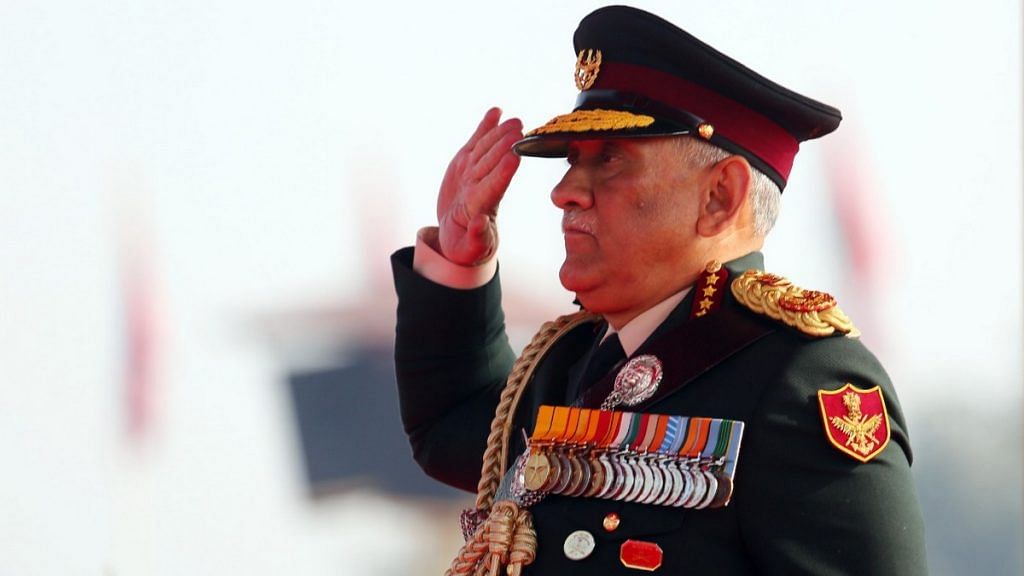New Delhi: Chief of Defence Staff (CDS) Gen. Bipin Rawat has told a parliamentary panel that the armed forces are actively looking at several steps to reduce the burgeoning defence pensions, and saving on the defence budget.
The steps under consideration include greater employment of personnel on short service commission (SSC) by making it a lucrative career option, increasing the retirement age of services personnel, and “outsourcing” of some of the services provided by the armed forces to the private sector.
In a submission to the Parliamentary Standing Committee on Defence, Gen. Rawat said SSC personnel are employed for a particular time frame, and can be given attractive choices during the service tenure, such as college education and study leave. The personnel can use these to educate themselves, and then retire from service with a lump-sum amount, which would reduce the forces’ pension liabilities.
The report of the parliamentary committee was presented in Lok Sabha and Rajya Sabha on 13 March.
The total defence budget in the current financial year stands at Rs 4.71 lakh crore, of which pensions constitute 28 per cent of the defence ministry’s overall expenditure.
Also read: Ready to operate beyond mandate to fight the pandemic: CDS Bipin Rawat
A long-pending reform
Making the SSC a lucrative career option has been among the long-pending reforms in the Army in particular.
As of now, only officers have the option of joining the armed forces on SSC. They retire at the end of their 14-year tenure with a gratuity amount. Many of them, however, opt for permanent commission at the end of their tenure.
Jawans, sailors and airmen retire after a certain number of years at the services with full pension, which varies between 15 and 20 years, depending on the force.
A senior defence officer told ThePrint that the Army has been working on making the SSC more lucrative to attract talent.
“Reducing the service limit from 14 years to a more realistic one, allowing study leave towards the end of the service, giving a suitable lump-sum amount on retirement beyond the existing gratuity and signing agreement with prominent institutions for higher education of personnel are some of the steps being discussed,” the officer said.
Also read: Wide variation in disability pensions of jawans, officers creating ‘heartburn’: CDS Rawat
On increasing retirement age
Gen. Rawat also told the standing committee that he will hopefully come to a decision, along with the three service chiefs, on increasing the retirement age of service personnel.
“If we can increase the retirement age, automatically the pension budget goes down,” he told the panel.
Rawat, however, added that it is being examined who all can serve in this “extended period”.
“We have identified some areas where this extension can happen. We have asked the services to identify more,” he said.
The CDS added that the intention is to initially make 30 per cent of service personnel serve till the extended age, which will be 58 or 60 years of age.
In an interaction with a group of journalists in February, Gen. Rawat had said the retiring age of defence services personnel, particularly below the rank of officers, should be raised to 58, from the current 37-38, to optimise their services and cut down on the increasing defence pensions.
Other ways to save on defence budget
Rawat also told the parliamentary panel that “jointsmanship” and integration of the defence forces will also lead to saving on the defence budget, as work can be outsourced.
“…A lot of issues that we are now doing from within our own sources can be outsourced,” he said.
“It is through increasing the service span, looking at jointness in seeing that we can optimise resources, and third is seeing how we can outsource some of our services to the private sector, that we intend to save the budget and then use it for modernisation,” he said.
On rationalising manpower in the forces, Gen. Rawat told the panel that while the need for manpower cannot be done away with, the use of technology is being examined.
“In some of the areas, we are trying to make sure that some of the logistic units can be brought down in size….We have almost collapsed a large part of our Army Postal Service; we have given it to the P&T Department to move our post. We are closing down our military farms. We have started closing down some of our workshops in peace stations where we feel it can be outsourced,” he told the panel, adding that there are other proposals in the pipeline.
Speaking to ThePrint, a second senior defence officer said there is no “quickfire solution” to reducing the pension budget, and that it needs to be done gradually in a focussed and planned manner. “After all it’s the security of the ‘active borders’ that the CDS spoke about,” this officer said.
“Increasing pensionable service, increasing age of retirement, increasing SSC officers, gradual reduction in force strengths, outsourcing non-combat jobs, increasing percentage of commutation of pension etc. are all factors that are being vigorously pursued towards rationalisation of the pension budget,” the officer added.
Also read: Not media, CDS Rawat should be talking to military chiefs about India’s defence reform
